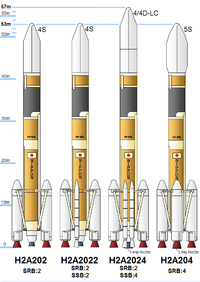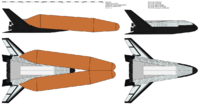Space and Aeronautical Research Agency (Kozakura): Difference between revisions
| Line 34: | Line 34: | ||
The Astronaut Corps is the unit of SARA responsible for selection, training, and provides crew members for manned space missions Kozakura is a part of. The SARA generally recruits astronauts who have degrees as scientists, engineers and/or medical doctors. In addition to being Kozakuran citizens, candidates must meet certain physical standards (including height, weight, hearing and visual acuity) as well as educational requirements. | The Astronaut Corps is the unit of SARA responsible for selection, training, and provides crew members for manned space missions Kozakura is a part of. The SARA generally recruits astronauts who have degrees as scientists, engineers and/or medical doctors. In addition to being Kozakuran citizens, candidates must meet certain physical standards (including height, weight, hearing and visual acuity) as well as educational requirements. | ||
== Launch Systems == | == Launch Systems == | ||
SARA uses several launch systems. The mainstay launch vehicles used by the agency is the latest versions of the Akatsuki-class Active Expendable Launch System. Introduced in 2023, the Akatsuki-class are a family of medium-lift vehicles. SARA uses the Oni-class solid fuel rocket for smaller launches. Since 2030, SARA has begun developing unmanned rocket-assisted launch vehicles for the Kaguya Mass Driver known as the OV121-class and has since constructed a fleet of five experimental vehicles. | |||
{| class="wikitable" | {| class="wikitable" | ||
|+ SARA Launch Systems | |+ SARA Launch Systems | ||
| Line 78: | Line 79: | ||
| | | | ||
| | | | ||
| | | | ||
|- | |- | ||
! colspan=7| Sounding Rocket Systems | ! colspan=7| Sounding Rocket Systems | ||
Revision as of 02:52, 21 May 2024
This article is incomplete because it is pending further input from participants, or it is a work-in-progress by one author. Please comment on this article's talk page to share your input, comments and questions. Note: To contribute to this article, you may need to seek help from the author(s) of this page. |
This article is for the Esvanovia-canon SARA. For the Ajax canon, see Space and Aeronautical Research Agency.
宇宙航空研究開発機構 Uchū kōkū kenkyū kaihatsukikō | |
 Logo | |
Mon | |
| Abbreviation | SARA K-SARA |
|---|---|
| Formation | 24 February 1987 |
| Headquarters | Onogoro Space Centre Onogoro Island, Kozakura |
Administrator | Taryaba Chinchoshi |
| Onogoro Launch Centre Kaguya Mass Driver Complex | |
Parent organisation | Joint Agency Managed By: |
Budget | K¥1.56 trillion (US$10 billion) (FY2021) |
The Space and Aeronautical Research Agency (SARA) (Japanese: 宇宙航空研究開発機構, Uchū kōkū kenkyū kaihatsukikō) is the Kozakuran national air and space agency. Jointly-managed by three governmental directorates, SARA was formed on 24 February 1987. SARA is responsible for research, technology development, and launch of satellites into orbit. The agency is also involved in many advanced missions such as asteroid exploration and human exploration of the moon.
History
Administration
All of SARA's physical presence is in the military-controlled Onogoro Island, south of the Kozakuran city-state.
SARA Astronaut Corps
The Astronaut Corps is the unit of SARA responsible for selection, training, and provides crew members for manned space missions Kozakura is a part of. The SARA generally recruits astronauts who have degrees as scientists, engineers and/or medical doctors. In addition to being Kozakuran citizens, candidates must meet certain physical standards (including height, weight, hearing and visual acuity) as well as educational requirements.
Launch Systems
SARA uses several launch systems. The mainstay launch vehicles used by the agency is the latest versions of the Akatsuki-class Active Expendable Launch System. Introduced in 2023, the Akatsuki-class are a family of medium-lift vehicles. SARA uses the Oni-class solid fuel rocket for smaller launches. Since 2030, SARA has begun developing unmanned rocket-assisted launch vehicles for the Kaguya Mass Driver known as the OV121-class and has since constructed a fleet of five experimental vehicles.

